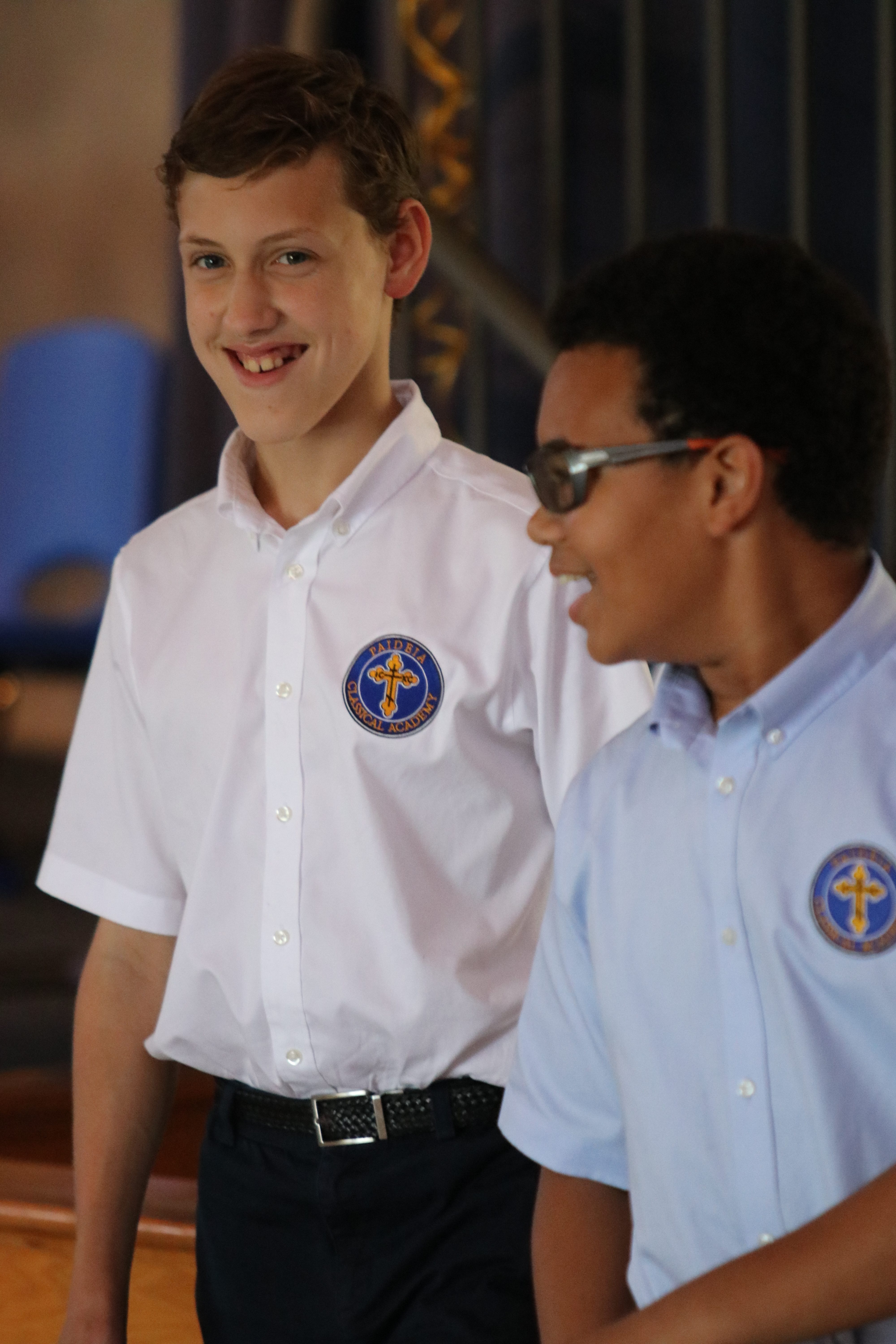Classical Education for the Rhetoric Stage
Rhetoric Stage (roughly fourteen- through eighteen-year-olds) Motto: “Becoming the bastions of Goodness, Truth, and Beauty is our wisdom.”
Having put on the armor of knowledge of concepts and principles in the Grammar Stage; having learned the reasoning behind such concepts and principles, along with attack and defense strategies in the Logic Stage; Rhetoric Stage students – mainly of high school age – are ready for battle: the battle of debunking false myths and gods, and defending what they have learned to recognize in all their schooling years as worthy of being admired, pursued, and defended.
Rhetoric Stage Content: classical poetry and prose; lives of the saints; strategy, tactical, and decision-making games; material logic and rhetoric; literary criticism; writing; American government, economics, and history; world history and geography; theory of music and visual arts; vocabulary from classical roots; natural sciences (dual focus: life and physical); and writings of the early Church Fathers.
Rhetoric Stage Goal: accomplishing the overall goals of the trivium – lifelong self-teaching and independent thinking abilities, a Christian Orthodox worldview, the maturity to lead a Christ-like life, and the courage to pursue and defend the immutable Goodness, Truth, and Beauty.
The quintessence of this stage consists in building our students’ ability to communicate what they have mastered, and seeing them accomplished as better persons for the glory of God and the benefit of their families, nation, and Church.
Rhetoric Stage Virtues: faith, wisdom, hope, knowledge, honesty, humility, courage, faithfulness, self-control, kindness, and gratitude.
What all our days look like in the rhetoric class:
– read / analyze / debate / prove
– expose / dissect / question
– write / confirm / refute
– critique / rebuild
– abstract / integrate
– strategic play
– compete / work in teams
Our Rhetoric Stage Masters will guide the students towards extracting and integrating the relevant knowledge, presenting it to others, and measuring it up against false knowledge. Higher mathematics and the application of the study of formal logic to all subjects (such as mastering essay writing, literary analysis, textual criticism and analysis, the scientific method, advanced language morphology and syntax, historical analysis, understanding of principles of law, politics, and economics, and their intrinsic relationship with history) are taught now.
Students in the rhetoric stage continue working at their own pace in both mathematics (mastering algebraic, geometry, trigonometry, set theory, probability, and statistics concepts) and English grammar (mastering all elements of language mechanics; sentence and paragraph structure and mechanics; reference sources; reports; and argumentative writing); as well as spelling and vocabulary (using a curriculum which addresses vocabulary from classical (Greek and Latin) roots; as well as mastering prefixes and suffixes; word origins and etymologies; synonyms, antonyms, homophones, and polysemantic words; analogies; word usage; word form; critical thinking; dictionary and glossary use; writing; and syllabification). The study of language arts is completed with two hours of classical world literature every week (students are going through all the ages of world literature, pausing on the works of some of the most significant authors of each age, and learning to write literary analysis essays, which employ concepts such as biography, themes, universality, and character analysis); students also receive one weekly hour of training in classical writing (following the progymnasmata method and curriculum), and one in of classical poetry and American short prose. Rhetoric students continue studying Patristics, where they contemplate and analyze the writings of the Holy Fathers. World history and geography continues its four-year cycle, and is supplemented with one year of American Government and Economics, and one year of Modern American History, while the sciences alternate on a three year pattern, going through biology, physics, and chemistry, to which one year of physiology and anatomy is added. The students continue their study of Spanish, along with the classical languages, Latin and Greek, and delve deeper into classical music, Byzantine chanting, and art. Depending on when they start their classical education journey, rhetoric students will go through two years of formal logic, and one of material logic, followed by one year of rhetoric, and one of philosophy; their faith education is rounded up at this stage with reading the Old Testament, studying the Law of God, and continuing reading the lives of the saints.
The Rhetoric Stage is not a stage at the end of which students are only able to pursue their vocations. Rhetoric Stage is not a stage at the end of which students are only able to recognize Beauty, Truth, and Goodness. Rhetoric Stage is not a stage at the end of which students are only able to defend that which is worth defending. More than anything else, this last stage before college is what prepares our children for the greatest achievement of all: becoming living testimonies that “the Lord is good”: Christ-like, transfigured, beautiful, good, and truthful new Adams and Eves.


